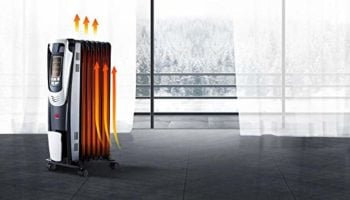We've independently reviewed this article to make sure it's as accurate as we can make it.
To find out more about our article creation and review process, check out our editorial guidelines.
Are you having a hard time comparing oil heaters vs electric heaters?
Don’t worry, you’re not alone. Choosing the right heater can be tricky, especially because there are so many options out there.
Luckily, you’ve come to the right place for answers.
Electric heaters are better for smaller rooms, as they heat quickly. Oil-filled heaters, on the other hand, are more efficient and better for large spaces. In this article, you’ll learn more about their differences to make the right choice for your needs.
Keep reading to choose the best heater!
Oil Heater vs Electric Heater
As with many appliances, I don’t believe there’s a “best” choice overall. Instead, there’s a “best” choice for different situations.
For example, you wouldn’t want an oil-filled heater in a tiny office you only use for an hour a day. At the same time, you’d love the silent heat while relaxing in a comfy chair and reading a book.
With that in mind, I’ve walked through which heater is best for different rooms in your home. That way, it’s much easier to say which one is definitely “best” for you.
Best Heater Type for the Bedroom
I’ve started with the bedroom because it’s super easy. Hands down, a good oil-filled heater is your best bet here.
First off is their silent operation. Unless you’re someone who uses white noise to sleep, quietness is one of the three most important factors in getting a night of good sleep. (The other two being darkness and coolness). If the heater’s for a bedroom, you’ll love how silently it keeps the whole room warm.
There’s another aspect I love, though. Since oil-filled heaters hold their heat for so long, they’re perfect for when you’re drifting off. You can switch it off as you get into bed, and the room will slowly cool down. We sleep deeper in cooler temperatures, so this is an ideal way to be cozy when getting into bed but also sleep well.
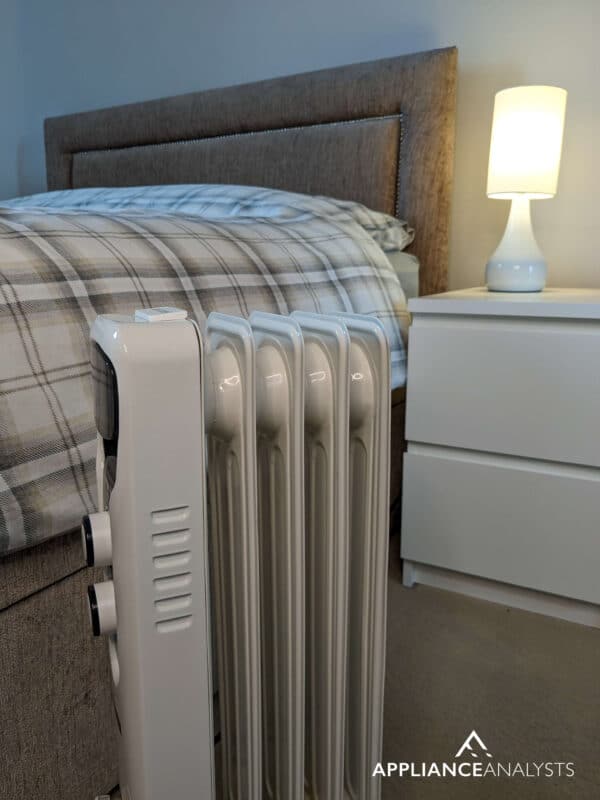
Space heaters just don’t work as well. The heat fades too quickly, and if you use a timer then you’ve got to deal with the noise as you try to drift off.
For the best sleep, opt for a quiet and long-lasting oil-filled heater.
Best Heater for a Baby/Kids Room
There’s one exception to the above recommendation for bedrooms. That’s if you’re looking for a heater to place with young children.
See, although oil heaters are silent – they also get really hot. They can be a bit of a hazard with young, inquisitive kids (or pets!).
For that reason, electric fan heaters are normally a better choice. You can get the best of both worlds with an oil-filled heater that’s safe to touch. If that sounds like something you’d be interested in – check out the DeLonghi ‘Dragon’ model in our Best Oil Filled Heaters post.
Best Heater for Small Rooms
BAM! It’s the left hook of the electric heaters. Oil-filled models take a bow on this one.
If you’ve got a small space, like a small office or utility room, then your best bet is with an electric fan heater.
These excel at quickly heating a small space and are especially efficient if you may be popping out now and then.
While an oil heater may win out if it’s a larger office you’re in for a long period of time, you’ll enjoy instant heat from a traditional fan heater much more in a smaller space.
Best Heater for Large Rooms
Can you guess this one?
A large room takes a lot of energy to heat. So efficiency is key here.
That’s why an oil-filled heater wins out as the top choice. Even though they take a little longer to warm the room up, the energy efficiency over time is just so much better than an electric fan heater.
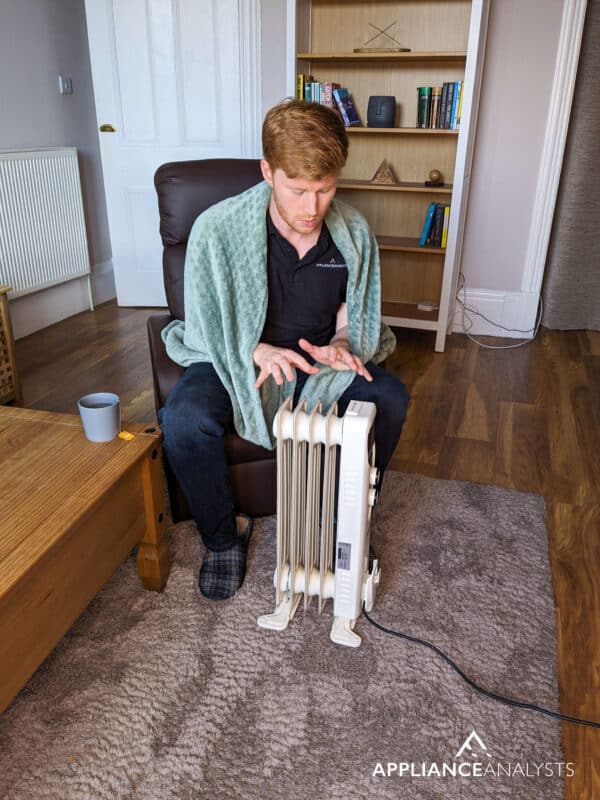
Make sure to pick a heater with a digital thermostat, and enjoy the energy savings as it changes to ‘low’ power while maintaining the warm temperature.
Best Heater for Basements
Basements are a bit of a toss-up. (Or, toss-down)
While it’s true that basements often have limited insulation, which can cause heat loss, the floor and walls surrounding a basement can act as an insulator.
This means that even a small space heater of either type may work well in a basement, as the heat loss through the walls and floors is limited.
However, it’s worth noting that oil-filled heaters may provide longer-lasting heat.
Best Heater for Garages/Workshops
Last up is for your garage or workshop. In this case, there’s a lot of similarities to a leaky/drafty basement – and so an oil-filled heater would be my recommendation.
However, I just want to add a note here. In fact, a propane heater can be a fantastic option for an external garage or workshop.
They don’t need electricity and they’re super easy to place. They provide huge amounts of heating – so any bad insulation or drafts won’t matter nearly as much.
Plus, propane heaters are also super handy to have around in case of a blackout. If, god-forbid, it’s the middle of winter and your power goes out for the night – I can’t understate the value of a good propane heater.
If you’re interested, we’ve got a full guide for propane heaters in garages here. Speaking of power outages, we’ve got a guide for that too! With 59 unique tips, just-incase the lights do go out.
Electric vs Oil Heaters: Pros & Cons
Sometimes it can be best to look at something from a top-down view. So let’s take a look at each fan type with all of its pros and cons.
Standard Electric Fan Heaters
These heaters use electricity to generate heat. They can quickly heat up a room and some of them come with very convenient features, such as timers.
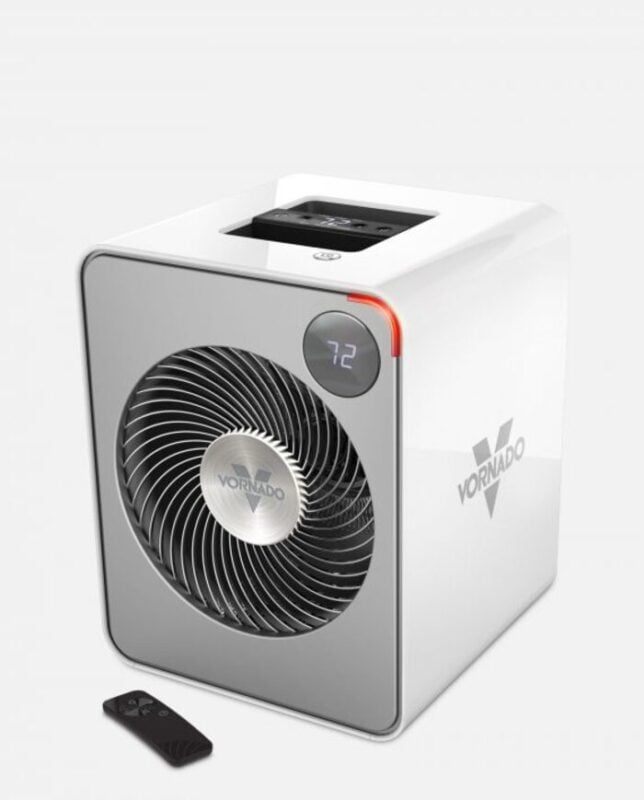
Electric heaters, just like any other product, come with their own set of advantages and disadvantages:
| Pros | Cons |
|---|---|
| Cheaper – With such a mass-manufactured product, there’s tons of competition, which means cheap prices. Great if you’re looking for a quick bit of extra heating power. | Quick Heat Loss – Since these heaters rely on spreading heat through the air, any bad insulation or drafty windows will make you lose the heat fast. |
| Faster – Electric fan heaters heat up a room in minutes. Their fans quickly spread the heat throughout the air of the space. | Higher Bills – Due to the quick heat loss, standard electric heaters need to provide higher heat for longer – costing more energy. |
| More Options – There are thousands of models to choose from. You’re more likely to find a model that is perfect for your taste. | Noisy – Especially for heaters with fans, there’s always some level of noise associated with standard electric heaters. |
| Safer for Kids – Most standard fan heaters aren’t overly hot to the touch, and the noise makes it more obvious that it’s on (and hot!) | Inaccurate – Unless you’ve got a real high-end model, standard convection heaters aren’t as good at keeping one constant temperature. They typically end up going a bit too hot or not hot enough and need you to fiddle with the controls every so often. |
| Bad for Allergies – Lastly, all that air movement brings up dust and allergens into the air. |
Oil-Filled Heaters
These heaters are typically more efficient than other types of heaters and can be used for large spaces.
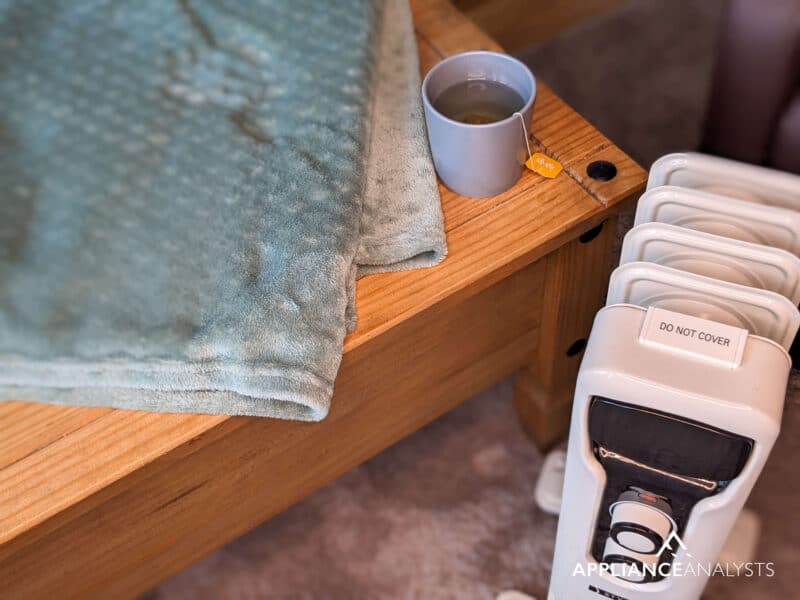
To help you make a decision, we’ve created a list of pros and cons for these heaters:
| Pros | Cons |
|---|---|
| Energy Efficient – These heaters are amazing at heat retention. Once they’re at the desired temperature, they can save you a ton of energy, only using low power to maintain the warmth. | Heavier – By relying on a heavy liquid over a larger surface, oil heaters typically weigh over 20 lbs. |
| Silent – Since all the heat comes from heating the oil, there’s basically no sound with these heaters. Fantastic if you find the noise of a fan distracting. | Slow to Heat – It takes a while to get all the oil to the desired temperature – expect a 30-minute wait before the room’s fully warm. |
| Safer for Fires – Fan heaters being blocked can lead to a fire hazard. Oil heaters are much safer, and don’t have fire risks if curtains/clothes are accidentally left on them. | More Expensive (Up Front) – Typically, these heaters cost a fair bit more than standard electric fan heaters. That said, they should also save you money in the long run. |
| Accurate – Thermostats on oil heaters tend to work really well and are included in most models. Oil heaters are great if you appreciate a continuous, constant temperature. | |
| Lasting Heat – Thanks to the high heat retention, an oil heater will stay hot for hours after it’s switched off. Great for energy savings, and at night. |
FAQ
Are Oil Heaters Cheaper to Run Than Electric?
Yes, oil-filled heaters are generally cheaper to run due to better heat retention.
Though they take longer to heat up, they can then change to ‘low’ power and use much less energy to maintain a warm temperature. Electric fan heaters lose their heat quickly, so need to stay on a higher power to keep the temperature high.
Is It Bad to Sleep With an Oil Heater On?
Not necessarily. Most models are designed to operate for extended periods of time.
However, you should always follow the manufacturer’s safety guidelines, such as keeping the unit away from flammable objects.
How Long Do Oil-Filled Heaters Last?
They can last up to 20 years! However, this may vary depending on the frequency of use and maintenance.
Make sure to regularly wipe your heater with a soft cloth to make sure it’s free of dust and debris. Store your heater in a dry, cool location when not in use.
How Long Does an Electric Heater Last?
With proper maintenance, an electric heater can last anywhere from 10 to 15 years!
Final Verdict: Electric vs Oil-Filled Heaters
Investing in a heater to get you through the winter shouldn’t be taken lightly. There’s pros and cons to each type, and I hope I’ve helped shed some light on which type might work best for you.
If you’re still comparing electric vs oil-filled heaters, try not to worry too much. Both heater types are excellent choices.
They’re both supremely portable, easy to place (only needing to be plugged in), and do an extra job of heating any small space. Choosing either of these to heat one room over using your whole-house heating system will save you hundreds of dollars over the course of a year. So you can’t really go wrong!
If this guide has helped you out, please consider checking out some more of our articles.
Have a great day!
-Craig






